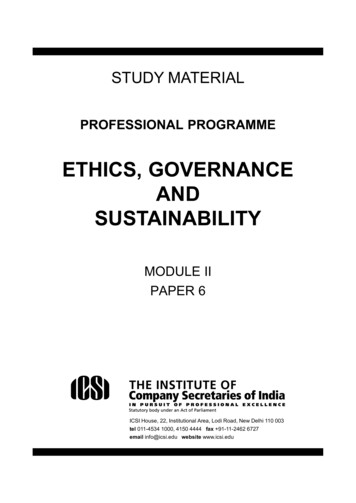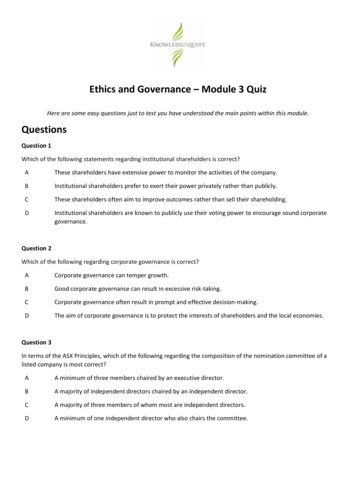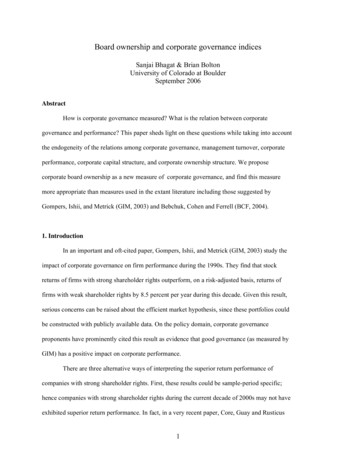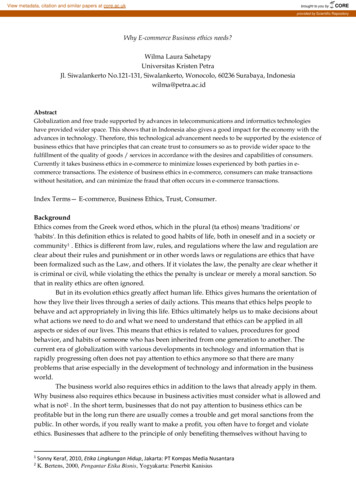
Transcription
Business EthicsandCorporate Governance(As per the New Syllabus 2018-19 of Mumbai University for BBI, Semester V)Nidhi ChandorkarTushar AgarwalNET, MBA (HRM),HOD – Department of Management Studies,S.M. Shetty College of Science, Commerceand Management Studies, Powai.SET, Ph.D. Scholar, MBA (Marketing),MBA (Corporate Governance),M.Com. (Management),BMS Coordinator,Chandrabhan Sharma College of Arts,Science and Commerce, Powai.ISO 9001:2008 CERTIFIED
AuthorsNo part of this publication may be reproduced, stored in a retrieval system, or transmitted in any form or by anymeans, electronic, mechanical, photocopying, recording and/or otherwise without the prior written permission of theauthors and the publisher.First Edition : 2018Published by:Branch Offices:Mrs. Meena Pandey for Himalaya Publishing House Pvt. Ltd.,“Ramdoot”, Dr. Bhalerao Marg, Girgaon, Mumbai - 400 004.Phone: 022-23860170, 23863863; Fax: 022-23877178E-mail: himpub@vsnl.com; Website: www.himpub.comNew Delhi:“Pooja Apartments”, 4-B, Murari Lal Street, Ansari Road, Darya Ganj,New Delhi - 110 002. Phon e: 011-23270392, 23278631; Fax: 011-23256286Nagpur:Kundanlal Chandak Industrial Estate, Ghat Road, Nagpur - 440 018.Phone: 0712-2738731, 3296733; Telefax: 0712-2721216Bengaluru:Plot No. 91-33, 2nd Main Road Seshadripuram, Behind Nataraja Theatre,Bengaluru - 560 020. Phone: 08041138821, 09379847017, 09379847005Hyderabad:No. 3-4-184, Lingampally, Besides Raghavendra Swamy Matham, Kachiguda,Hyderabad - 500 027. Phone: 040-27560041, 27550139Chennai:New-20, Old-59, Thirumalai Pillai Road, T. Nagar, Chennai - 600 017.Mobile: 09380460419Pune:First Floor, “Laksha” Apartment, No. 527, Mehunpura, Shaniwarpeth(Near Prabhat Theatre), Pune - 411 030. Phone: 020-24496323, 24496333;Mobile: 09370579333Lucknow:House No. 731, Shekhupura Colony, Near B.D. Convent School, Aliganj,Lucknow - 226 022. Phone: 0522-4012353; Mobile: 09307501549Ahmedabad:114, “SHAIL”, 1st Floor, Opp. Madhu Sudan House, C.G. Road, Navrang Pura,Ahmedabad - 380 009. Phone: 079-26560126; Mobile: 09377088847Ernakulam:39/176 (New No. 60/251), 1st Floor, Karikkamuri Road, Ernakulam,Kochi - 682 011. Phone: 0484-2378012, 2378016; Mobile: 09387122121Bhubaneswar:Plot No. 214/1342, Budheswari Colony, Behind Durga Mandap,Bhubaneswar - 751 006. Phone: 0674-2575129; Mobile: 09338746007Kolkata:108/4, Beliaghata Main Road, Near ID Hospital, Opp. SBI Bank,Kolkata - 700 010. Phone: 033-32449649; Mobile: 07439040301DTP by: SunandaPrinted at: Rose Fine Art, Mumbai. On behalf of HPH.
PREFACESuccess of any business, in today’s time, is judged not only by its revenue but also by its socialcontribution and environmental friendly strategies. Hence, the benchmarking of success is done on thebasis of triple bottom line – Profit, Planet and People. Therefore, knowledge and importance of Ethicsand Governance is essential for all the budding managers, bankers, etc.This book is based on the syllabus prescribed by the University of Mumbai, which has beendesigned to educate the final year students of Banking and Insurance domain of commerce aboutethics, governance and corporate social responsibilities. The book deals with concepts as well as itsmechanism of application in Indian context.The first chapter helps in developing an understanding towards the conceptual part of ethics ingeneral and business ethics in specific. It also covers an overview of different functional areas underthe scope of business ethics like marketing, foreign trade, copyright, etc.The second chapter helps in developing decision-making skill and entails about variousapproaches to reduce ethical dilemma. These mechanisms are based on the theories developed byphilosophers like Immanuel Kant, Aristotle, Jeremy Bentham, etc. Mahatma Gandhi suggestedtrusteeship principle as approach towards managing business. The application of this principle, and ingeneral, the Gandhian approach for managing modern businesses has also been discussed in detail.The chapter also covers the functional areas like advertising and finance in light of the unethicalpractices and approaches to eliminate or minimize them.The third chapter is dedicated to the concept of Corporate Governance. It discusses about theimportance and principles of corporate governance and focusses mainly on the Indian CorporateGovernance System. The mechanism of Corporate Governance in India comprises The Companies Act,2013, SEBI and Clause 49 of listing agreement. The unit also helps in viewing various perspectives ofCorporate Governance by studying the theories.The ancient Indian approach towards governance was based on the teachings of the scriptures likeArthashastra and religious scriptures like Geeta, Quran and Bible. The fourth chapter also deals withthe modern evolution of corporate governance in India.Finally, the global perspective of Business Ethics is discussed. With the evolution of businesses,variety of scams and frauds have also taken place. The knowledge of these scams will help usdeveloping a strong and ethical business set-up for long-term benefit of all the stakeholders.Authors
SYLLABUSModules at a GlanceUnit12345ModulesIntroduction to Business EthicsApplication of Ethical Theories in BusinessIntroduction to Corporate GovernanceGenesis and Implementation of Corporate Governance in IndiaGlobal ScenarioTotalSr.No.1234No. ofLectures101015151060Modules/UnitsIntroduction to Business EthicsDefinition, Meaning, Nature of Ethics, Meaning of Moral and Ethics.Types of Ethics, Importance of Ethics, Business Ethics – Meaning and Nature.Importance of Ethics in Business, Areas of Business Ethics, Meaning of Functional Ethics, Typesof Ethics According to Functions of Business – Marketing Ethics, Foreign Trade Ethics andEthics Relating to Copyright.Ethics relating to Free and Perfect Competitive Market.Application of Ethical Theories in BusinessEthical Decision Making: Decision Making (Normal Dilemmas and Problems):(I) Utilitarianism (J. Bentham and J.S. Mill), (II) Deontology (I. Kant) Virtue Ethics(Aristotle). Gandhain Approach in Management and Trusteeship, Importance and Relevance ofTrusteeship Principle in Modern Business. Ethical Issues in Functional Areas of Business.Ethics in Advertising (Truth in Advertising). Ethical Issues in Finance.Introduction to Corporate GovernanceDefinition and Conceptual Framework of Corporate Governance, Business Ethics – an importantdimension to Corporate Governance, Fair and Unfair Business Practices. Theoretical Basis ofCorporate Governance, Mechanism- Corporate Governance Systems, Indian Model ofGovernance, Good Corporate Governance, Obligations towards Society and Stakeholders.Theories Underlying Corporate Governance (Stakeholder’s Theory and Stewardship theory,Agency Theory, Separation of Ownership and Control, Corporate Governance Mechanism:Process, Indian Model, OECD, and Emphasis on Corporate Governance (TransparencyAccountability and Empowerment).Genesis and Implementation of Corporate Governance in IndiaIntroduction principles – Arthashastra and Good Governance in ancient India, Protection ofInterest of Customers and Investors, Historical Perspective of Corporate Governance and Issuesin Corporate Governance.Values: Meaning, Types, Teaching from Scriptures like Gita, Quran and Bible, Value Systems inBusiness.
5Implementation of Corporate GovernanceRole of Board of Directors and Board Structure, Role of the Non-executive Director, Role ofAuditors, SEBI Growth of Corporate Governance. Role of Government, Corporate Governancein India. Accounting Standards and Accounting Disclosures. Finance Reporting and CorporateGovernance, Non-accounting Regulations in Corporate Governance, Corporate Governance andCSR, Family Owned Business - Background, Family Businesses in India, Need forProfessionalization and Transparency in Family Business.Global ScenarioBusiness Ethics in Global EconomyEthics in the Context of Global Economy, Relationship between Business.Ethics and Business Development, Role of Business Ethics in Building a Civilized Society.Corporate Governance and Issues Related to Scams.Corruption: Meaning, Causes and Effects.Frauds and Scams in Banks, Insurance Companies, Financial Institutions, Measures to OvercomeFraud and Corruption, Zero Tolerance of Corruption.
PAPER PATTERNMaximum Marks: 75Questions to be set: 05Duration: 2 ½ Hrs.All questions are compulsory carrying 15 Marks each.QuestionNo.ParticularMarksQ.1Objective QuestionsSub-questions to be asked (10) and to be answered (any 08)Sub-questions to be asked (10) and to be answered (any 07)(*Multiple Choice/True or False/Match the Columns/Fill in the Blanks)15 MarksQ.2Full Length QuestionORFull Length Question15 MarksFull Length QuestionORFull Length Question15 MarksFull Length QuestionORFull Length Question15 MarksTheory QuestionsTheory QuestionsORShort NotesTo be asked (05)To be answered (03)08 Marks07 MarksQ.2Q.3Q.3Q.4Q.4Q.5Q.5Note:Theory question of 15 Marks may be divided into two sub-questions of 7/8 and 10/5 Marks.15 Marks15 Marks15 Marks15 Marks
CONTENTSChapter 1Introduction to Business Ethics1 - 17Chapter 2Application of Ethical Theories in Business18 - 28Chapter 3Introduction to Corporate Governance29 - 61Chapter 4Genesis and Implementation of Corporate Governance in India62 - 87Chapter 5Global Scenario Business Ethics in Global Economy88 - 101
Chapter1Introduction to Business Ethics Ethics: Definition, Meaning and Nature Meaning of Moral & Ethics Types of Ethics Importance of Ethics Business Ethics -Meaning and Nature Importance of Ethics in Business Areas of Business Ethics Meaning of Functional Ethics Types of Ethics According to Functions of Business – Marketing Ethics, ForeignTrade Ethics and Ethics Relating to Copyright Ethics relating to Free and Perfect Competitive MarketThe concept of “ethics” was introduced by Socrates, and defined as a philosophical discipline byAristotle. The word Ethics have been taken from the ancient Greek word ‘ethikos’ which itself isderived from the Greek word ethos, meaning custom or character. In philosophy,in general, ethicalbehavior is that which is “good.” The field of moral philosophy involves developing, defending, andrecommending concepts of right and wrong behavior. These concepts do not change as one’s desiresand motivations. They are not relative to the situation.Hence, Ethics can be said to be the basic concepts and fundamental principles of decent humanconduct. It is a philosophy which includes study of universal values such as the essential equality ofgender, human or natural rights, obedience to the law of land, concern for health and safety and,increasingly, also for the natural environment.
2 Business Ethics and Corporate GovernanceETHICS: DEFINITION, MEANING AND NATUREDefinition and MeaningEthics can be said to be ‘the field of study that is concerned with values, standards, morals,principles etc., which are used to base ones decisions or actions. It is a discipline tries to set up criteriafor “good” and “bad” behavior/actions, and to evaluate the motives for these actions, and theconsequences.Ethics is a branch of philosophy that involves systematizing, defending, and recommendingconcepts of right and wrong conduct. Ethics seeks to resolve questions of human morality by definingconcepts such as good and evil, right and wrong, virtue and vice, justice and crime.Ethics deals with fundamental issues of practical decision making, and its major concerns includethe nature of ultimate value and the standards by which human actions can be judged right or wrong.Nature of EthicsEthics is a study of human behaviour in different external situations. Humans by default has acapability of judging good and bad, right and wrong behaviour based on the situation. Therefore ethics,though a relative and subjective term has some common features:(i)Based on Moral and Social Values: Ethics has its roots in the individual values called asmoral values and collective values also called as social values. As any system ororganisation is a sub set of society and ethics are associated with human behaviour it cannotviolate or contradict social and moral values.(ii)Ethics as Social Science: Ethics is a study under social science. Though there is anargument whether ethics is a science or an art. But experts are of the opinion that ethics ismore of science than an art because it is a systematic knowledge about moral behaviour andconduct of human beings.(iii)Ethics as Normative Science: The term normative implies a guide or control of action. So,normative ethics tells us what we ought to do.(iv)Voluntary: Ethics deals with human conduct that is voluntary and not formed naturally byany persons or his circumstances. It is created due to system and organisation and isvoluntarily followed by individuals in it.(v)Externally enforced: Ethics leads to coexistence and smooth functioning of a system,hence it has to be enforced to a person and is not in-born as morality.(vi)Basis of Code of Conduct: Ethics of a system, (like organisation, institution or group) helpsin forming its code of conduct which in turn dictates the expected behaviour of theindividuals involved in it.(vii)Requires Education and Guidance: Ethics is learned behaviour. Individuals need to beinformed, educated, guided and motivated so that they follow the ethical norms with its truespirit.
Introduction to Business Ethics(viii) 3Relative Term: As ethics is based on, and for smooth functioning of, the system hence ithas to change in response to environmental conditions. Therefore, ethical values may changewith time and environmental conditions.Based on above points, we can understand that ethics values may change for a person withchange in his environment or occupation. Therefore, the nature of ethics can be well understood bydividing it into three categories of features:A.Personal EthicsB.Professional EthicsC.Managerial EthicsNature of Personal EthicsPersonal ethics refer to personal or self-created values and codes of conduct of a person. Theseethics are instilled in an individual from the childhood by their parents, friends and family. Examplesof personal ethics can be honesty, openness, commitment, unbiased behaviour and sense ofresponsibility. It remains with him all through his life and is reflected by his actions and words. Aperson’s personal ethics are also revealed in a professional situation through his behaviour. Personalvalues are the conception of what an individual or a group regards as desirable. Personal ethics refersto the application of these values in everything one does. Personal ethics might also be called morality,since they reflect general expectations of any person in any society, acting in any capacity. Personalethics is a category of philosophy that determines what an individual believes about moralityand right and wrong.The principles of personal ethics are:(i)Concerns and respect for the autonomy of others(ii)Honest and the willingness to comply with the law(iii)Fairness and the ability not to take undue advantage of others(iv)Benevolence and preventing harm to any creatureNature of Professional EthicsA profession is a vocation or calling, especially one that involves a specific branch of advancedlearning or a branch of science, for example, the profession of a doctor, advocate, professor, scientistfor a business manager.A professional who is engaged in a specified and is paid for services rendered based on specificskills. Professional ethics are those values and principles that are introduced to an individual in aprofessional organisation. Each professional is expected to strictly follow these principles. Thisapproach is imperative in professional settings as it brings a sense of discipline in people as well ashelps to maintain office decorum. Professional ethics are those values and principles that areintroduced to an individual in a professional organisation. Each employee is meant to strictlyfollow these principles of his profession in the organisation. They do not have a choice.
4 Business Ethics and Corporate GovernanceAlso, this approach is imperative in professional settings as it brings a sense of discipline inpeople as well as helps to maintain decorum in offices. Some examples may include confidentiality,fairness, transparency and proficiency.There are some basic principles professionals are expected to follow in their professional career.These are the following:(i)Impartial and objective(ii)Openness: full disclosure(iii)Confidentiality: trust(iv)Due diligence(v)Duty of care(vi)Fidelity to professional responsibilities; and(vii)Avoid potential or apparent conflict of interest.Nature of Managerial EthicsA complex workplace can be transformed into a less complicated landscape when thought isgiven to establishing some ground rules. Companies that incorporate a set of managerial ethics orguidelines create a clear path for managers to reference during tough decision-making scenarios.Managerial ethics is a set of principles and rules dictated by upper management thatdefines what is right and what is wrong in an organisation. Managerial ethics is a major factoraffecting how socially responsive an enterprise will be in the long term. The managerial ethics canlead types of responses given by a manager. Proactive responses are likely to be more ethical sincethey will go beyond minimum legal requirements. They are more consistent with the high socialexpectations as discussed earlier. Reactive responses either conforms only with the minimum legalrequirements or even attempt to avoid legal requirements through long court cases, lobbying efforts toavoid responsibility and so forth. The ethics of an enterprise’s managers are a key factor in decisionmaking and may be formed by many forces.MEANING OF MORAL AND ETHICSEthics and morals relate to “right” and “wrong” conduct. While they are sometimes usedinterchangeably, they are different: ethics refer to rules provided by an external source, e.g., codes ofconduct in workplaces or principles in religions. Morals refer to an individual’s own principlesregarding right and wrong.Difference Between Ethics and MoralityETHICSMeaningThe rules of conduct recognized in respectto a particular class of human actions or aparticular group or culture.MORALITYPrinciples or habits with respect to right orwrong conduct. While morals also prescribedos and don'ts, morality is ultimately apersonal compass of right and wrong.
Introduction to Business Ethics Where dothey comefrom?Social system - ExternalIndividual – InternalWhy we do it?Because society says it is the right thing todo.Because we believe in something being rightor wrong.FlexibilityEthics are dependent on others fordefinition. They tend to be consistentwithin a certain context, but can varybetween contexts.Usually consistent, although can change if anindividual’s beliefs change.OriginGreek word "ethos" meaning"character"Latin word "mos" meaning "custom"AcceptabilityEthics are governed by professional andlegal guidelines within a particular timeand place.Morality transcends cultural norms5TYPES OF ETHICSFollowing three major types of ethics as explained below:(i)Transactional Ethics(ii)Participatory Ethics(iii)Recognition Ethics(i) Transactional EthicsMan is a social animal. He has to act and react with others through different transactions. Thepractices of ethics in all these transactions is called as transactional ethics. In order to let each party’stransaction run smoothly, all parties have to accept the principle of equality, implying that every agentshould allow every other the same amount of freedom or action he claims for himself. The moralprinciple of equality tells us where to refrain from intrusions in the freedom of action of others whilefollowing one’s own affairs, which is negative principle as well as basic.Example: I need vegetables from vegetable vendor. The vendor wants customer like me forsurvival, as we both are dependent on each other, as long as both of us contribute appropriately,together we generate surplus that none of us on our own are able to produce.In order to let things run smoothly, again adherence to two specific moral principles is required: Principle of honesty Principle of reciprocityThe domain of ethics covering transactions that are performed on the basis of simultaneous orconnected interest and that are general by the principles of equality, honesty and reciprocity ifindicated as the domain of transactional ethics.
6 Business Ethics and Corporate Governance(ii) Participatory EthicsParticipatory ethics is a privileged part of business ethics. Parties cooperate in order to producemore distant common good that has three characteristic features: The good can only be realised through the participation of all parties. Participation cannot be enforced into explicit moral obligation to take part in the project. Principle of decency where a real opportunity to contribute to the general welfare presentsitself and no insurmountable obstacle arise, one should have solid moral reasons not to gofor it.The important thing is that parties in the alliance voluntarily, committing themselves to a selfimposed and non-enforceable obligation. This entails a specific type of social relations that is guidedby two particular moral principles: Principle of decency Principle of enunciationParticipatory ethics is about the shape of solidarity in an age of individualisation. It is the ethicsof the civil society, recently rediscovered as a solid ground for collective arrangements where both themarket and the state fail. By participating in a regular basis, in common projects on behalf of generalwelfare, a corporation demonstrates that it can take seriously its corporate citizenship.(iii) Recognition EthicsAs human beings, people are endowed with the ability to understand the problems of others.This quality leads to the recognition of individuals, institutions and societies. Conflicting situationscan be solved by the correct recognition of the situation.Example: The employees aged 57-60 years morally obliged to retire to give way to someyounger colleagues, who being in the midst of their careers, can raise a more weighty claim to a job.The domain of recognition politics covers a large part of traditional ethics interventions. Ethics, in fact,is about asymmetrical relations about the rights of interest of the one generating a duty for another.Recognition ethics clarifies and supports this type of discussion applying the two principlesmentioned above and other moral convictions that are considered appropriate.IMPORTANCE OF ETHICSEthics concern an individual’s moral judgements about right and wrong while she/he is in asystem. Decisions taken within an organisation may be made by individuals or groups, but whoevermakes them will be influenced by the culture of the company. Other than providing long term benefits,ethics are important because:1.Developing Capability to Judge Right and Wrong: Ethics is a subject that deals withhuman beings. Humans by nature are capable of judging between right and wrong, good andbad behaviour. Since human beings are associated with values and morals, ethics isimportant.
Introduction to Business Ethics 72.Develops Trust: Ethics is closely related to trust. Most of the people would agree on thefact that to develop trust, behaviour must be ethical.3.Long-Term Survival of Business: Ethics are important not only in business, but also in allaspects of life. The business of society which lacks ethics is likely to fail sooner or later.4.Covers all aspects of Life: Ethics are important not only in business but also in all aspectsof life because it is an essential part of the foundation on which a civilised society is build.5.Guiding Actions: Ethics primarily aim to guide the behaviour and actions of a person orsociety or a business through adherence to certain moral principles, standards and values sothat the others are not harmed by one’s unfair, immoral or unjust actions.6.Aids the Law: Ethics makes for a complementary logic that aids laws in balancing equity,fairness and justice in those matters of disputes, and actions that touch or affect others.7.Caters to Wider Issues: The aim of law and ethics may be similar, but ethics will examinewider social issues involved with an action and may direct the individual or a company toact differently from what law would do in normal course.8.Balancing Instrument for Social Justice: Ethical considerations, along with legalprovisions, act as the ‘balancing instrument’ for social justice , which are essential forsustained growth of a society.BUSINESS ETHICS – MEANING AND NATUREMeaning and DefinitionBusiness Ethics is a form of Applied Ethics. It originates from individuals, organizationalstatements or from the legal system. It can be said to be the attitude, culture and manner of doingbusiness by the business community. It is a framework of contemporary organizational standards,principles, sets of values and norms that govern the actions and behavior of an individual in thebusiness organization.According to Andrew Crane, “Business ethics is the study of business situations, activities,and decisions where issues of right and wrong are addressed.” Business ethics are those principles,policies or philosophies that are concerned with moral judgment &good conduct as they are applicableto business situation.Business Ethics is a branch of ethics which prescribes standards of how the business is to becarried out. It lays down guidelines for the company’s response and accountability to its variousstakeholders. It gives a deeper understanding of what is good and bad, what is moral and immoral orwhat actions are right or wrong in the operations of a business with respect to its customers,employees, investors, society and all other stakeholders – in order to protect them from harm anddamages to their interests.
8 Business Ethics and Corporate GovernanceFeatures of Business EthicsTo develop a better understanding for Business Ethics, we should examine the key features:1.Code of conduct: Business ethics is the code of conduct which businessmen should followwhile conducting their normal business activities.2.Based on moral and social values: Business ethics is based on well-acceptedmoral/principal values. It suggests moral of conduct for businessmen. They include selfcontrol, service to society and fair treatment to social groups and not to harm/ exploit others.3.Provides basic framework: Business ethics provides the framework within which businessis to be conducted. It suggests legal, social, moral, economic and cultural limits withinwhich business has to be operated. It suggests what is good and what is bad in business.4.Needs willing acceptance for enforcement: Business ethics cannot be enforced by law orby force. It must be accepted as self-discipline by businessmen. It should come from withinthe businessmen.5.Education and guidance required for introduction: Businessman should be given propereducation, guidance and training in order to motivate them to follow ethical businesspractices.6.Not against profit making: Business Ethics is not against fair profit making. However, it isagainst profiteering by cheating and exploiting consumers, employees or investors. Itsupports expansion of business activities but by fair means and not through illegal activitiesor corrupt practices.IMPORTANCE OF ETHICS IN BUSINESSEthics is important for any business, big or small, for its long term success. Following are thebenefits of ethics for any business:1.Decision Making: It is our means of deciding a course of action. Without it our actionswould be random and aimless.2.Standardizing Behaviour of Employees: Business Ethics is about standard of behavior inworkplace, with partners, colleagues, customers etc. Many companies have standard code ofethics which everyone in the organization has to follow.3.Greater Customer Satisfaction: Customer will be satisfied only if the business follows allthe business ethics. Business ethics is needed to make business activities fair to consumers.It checks business malpractices and offers protection to consumers.4.More Responsible Behaviour: Business ethics is needed in order to make businessmenconscious as regards their duties and responsibilities towards consumer and other socialgroup.5.Improved Confidence of Stakeholders: Business ethics is needed in order to improve theconfidence of consumers as regards quality, price, reliability etc. of goods and services
Introduction to Business Ethics 9supplied. It also helps in retaining confidence of stakeholders like financial institutions,shareholders, buyers, suppliers etc.6.Protecting Rights: Business ethics is needed for the protection of rights of consumers at thebusiness level such as right to health & safety, right to be informed, right to choose, right tobe heard etc.7.Enhanced Corporate Image: Business ethics is needed in order to create good image ofbusinessmen in the society and also for avoiding public criticism. Ethical business getspublic support while unethical business is criticized by all. Public will be ready to invest orlend money only if they are convinced that the organization is following fair businesspractices.8.Cordial Relationship and Support: Business ethics is needed in order to develop cordialand friendly relations between business and society.9.Long Term Survival and Growth: Organizations doing business ethically will continue tosurvive & prosper for the long time. Hence, it is important for the growth & development ofthe business in the long term.10.Uniform Behaviour Across Organisation: Ethics in business are important most of allbecause we pass them on to others. We have the ability to show others the correct way to actand behave by remaining ethical in the way we live.AREAS OF BUSINESS ETHICSEthical problems and phenomena arise across all the functional areas of companies and at alllevels within the company.
The third chapter is dedicated to the concept of Corporate Governance. It discusses about the importance and principles of corporate governance and focusses mainly on the Indian Corporate Governance System. The mechanism of Corporate Governance in India comprises The Companies Act, 2013, SEBI and Clause 49 of listing agreement.










